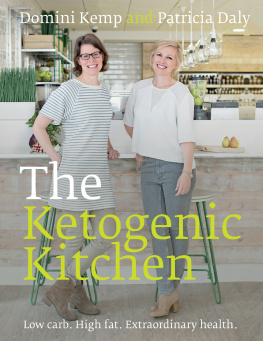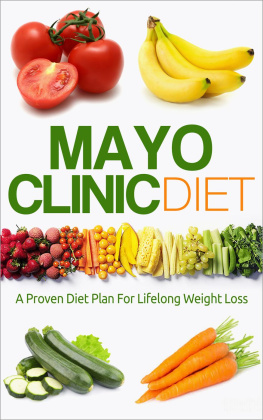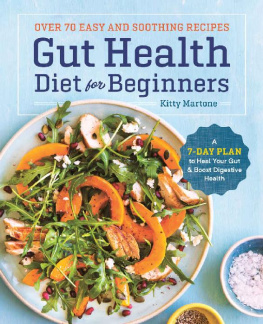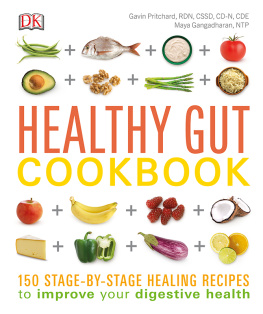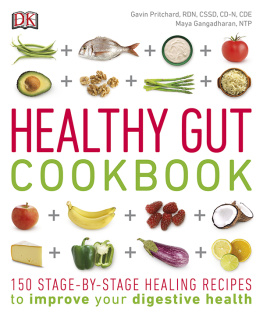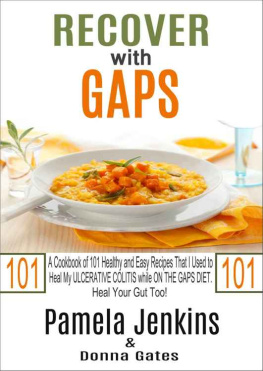The
Ketogenic
Kitchen Low carb. High fat. Extraordinary health. Domini Kemp and Patricia Daly Chelsea Green Publishing White River Junction, Vermont Information given in this book is not intended to be taken as a replacement for medical advice. Any person with a condition requiring medical attention should consult a qualified medical practitioner or therapist.
Acknowledgments We would like to thank everyone in Gill Books who put so much hard work into making this book happen, especially Nicki Howard, Catherine Gough and Teresa Daly, and the inside-outsiders Graham Thew and Kristin Jensen.
We also owe a huge debt to photographer Joanne Murphy and stylist Orla Neligan, who did an amazing job. Thank you for making it all look so gorgeous. Huge thanks to Gillian Fallon for her endless talents, from chopping and cooking to writing and editing. Gillian was the first person to really put some shape on all the writing, and we are extremely grateful for her brilliant editing skills. Thanks also to Melissa Turner for her nutritional analysis. We also want to thank all the doctors, nurses and scientists that help people overcome this disease every day.
We are both alive because of the excellent care that we received. Now its our turn to try to give something back. A huge amount of support and encouragement as well as excellent opinions in this book came from Professor Adrienne Scheck, Dr Colin Champ, Dr Mark Atkinson, Dr Georgia Ede and Susan Wood. We thank them sincerely for making the time to read the book, make suggestions and to contribute to the book. We cannot thank you enough. Thanks also to many dear colleagues and friends, especially Alessandro Ferretti (www.chhp.com), Emily Maguire (www.lowcarbgenesis.com), Lily Nichols (www.realfoodforGD.com), Maev Creaven (www.nutritioncentre.ie) and Ivor Cummins (www.thefatemperor.com) for their continuous support, encouragement and sharing of knowledge.
And finally, special thanks to our families and friends. Throughout our treatment you were always there for us, and for that we are eternally grateful. Without you, there would have been no book. Thank you. Domini Kemp and Patricia Daly, 2016
www.theketogenickitchen.com Expert opinions PUBLIC INTEREST IN ketogenic diets for the treatment of cancer and other challenging health conditions is growing rapidly much faster, in fact, than the availability of high-quality resources people can use to apply these valuable dietary principles to their daily lives. That is precisely what makes The Ketogenic Kitchen such a timely treasure.
I follow a ketogenic diet myself, so I can tell you firsthand that it is safe, comfortable and effective. While it can be challenging to learn and adjust to at first, the benefits are well worth it. As a psychiatrist with a special interest in nutrition and metabolism who studies, writes about and prescribes ketogenic diets, I can tell you that they have uniquely powerful healing properties for the brain. Ketogenic diets have been used to treat a variety of complex neurological and psychiatric conditions, from epilepsy to Parkinsons disease to Alzheimers dementia. There is even emerging evidence that people with bipolar disorder and other mood disorders may benefit from a ketogenic diet. These specially formulated low-carbohydrate, adequate-protein, high-fat diets rescue us from the invisible rollercoaster of blood sugar, insulin and stress hormones that most people ride all day long without even realising it.
This dangerous pattern destabilises brain chemistry, causing spikes and crashes in energy, mood and concentration throughout the day. This is why I recommend low-carbohydrate/high-fat and ketogenic diets to my patients with mood and attention disorders. Ketogenic diets are not just good for the brain, they are good for the whole body. Conventional carbohydrate-based diets flood our bodies with sugar and wreak havoc with our metabolism, which can lead to type 2 diabetes, obesity and other serious health problems, including cancer. It is firmly established that cancer cells thrive on glucose (sugar) and have a very difficult time burning fat, whereas most normal cells can easily burn fat for energy. Furthermore, excess glucose in the blood triggers insulin surges, which promote the growth and multiplication of all cells, including cancer cells.
Ketogenic diets nourish normal cells with healthy fats and proteins and shield them from the damaging effects of excess sugar, starch and protein (all of which can turn into glucose) while simultaneously depriving cancer cells of the fuel they need to grow and spread. There is no other nutritional approach that can do all of these wonderful things. Patricia Daly and Domini Kemp have written an authoritative guide that will help you put the powerful science of ketogenic principles to work in your daily life. Their hard-earned wisdom coupled with their culinary expertise set this book apart from other health-oriented cookbooks. For issues ranging from mental health disorders to diabetes to cancer, The Ketogenic Kitchen will be indispensable to those seeking to incorporate a powerful, science-based nutritional approach into their comprehensive treatment plan. Georgia Ede, MDPsychiatrist and Nutrition Consultantwww.diagnosisdiet.comTHERE IS A growing awareness among oncologists that cancer is primarily a mitochondrial metabolic disease according to the original theory of Otto Warburg.
A gradual damage or protracted insufficiency of cellular respiration eventually causes cells to adapt a fermentation metabolism in order to survive. Fermentation is a primitive form of energy metabolism that predominated in most organisms before oxygen appeared in the atmosphere some 2.7 billion years ago. Like many cancer cells, unbridled proliferation was a key feature of organisms that fermented. Only those cells that can transition from respiration to fermentation have the potential to become cancer cells. Cells that cannot make this energy transition will die and can never become cancer. Glucose and glutamine are prime fermentable fuels for cancer cells.
The regulation of these metabolites can be effective in cancer management. The large numbers of gene mutations discovered in the various cancers arise as secondary effects of insufficient respiration with compensatory fermentation. Insufficient respiration produces reactive oxygen species that cause mutations in the nuclear genome. The oncogene and tumor suppressor gene mutations are not the cause of cancer but arise as effects of destabilized energy metabolism. This fact cannot be overemphasized, as the cancer industry believes that cancer arises from genetic mutations that must be targeted to obtain resolution. The misunderstanding that cancer is a genetic disease rather than a mitochondrial metabolic disease has significantly delayed progress towards development of effective therapies.
As damage to mitochondrial respiration with compensatory fermentation is the origin of cancer, protection of mitochondrial energy metabolism can prevent cancer. Patricia Daly has done an excellent job debunking myths about fats, proteins, and carbohydrates. Healthy diets can protect cellular mitochondria from damage and thus reduce risk of cancer. We also showed that the ratio of blood glucose to blood ketone bodiesi.e. the Glucose Ketone Index (GKI)could predict survival in preclinical mouse models of invasive brain cancer and in advanced systemic metastatic cancer (Meidenbauer et al. Nutrition & Metabolism (2015) 12:12).
Patricia Daly also discusses the utility of the GKI in cancer management. We consider GKI index values of 1.0 or below as effective for either the management or prevention of cancer. Cancer patients can therefore measure their GKI to determine whether the specific diet they are consuming might be able to help manage their particular cancer. Some degree of dietary energy reduction is often required to help cancer patients enter the GKI therapeutic zone, as an unrestricted consumption of even fat-enriched diets are not likely to produce GKI values of 1.0 or below. It will therefore be necessary for cancer patients to carefully monitor their GKI values if diet therapy is considered for cancer management.

